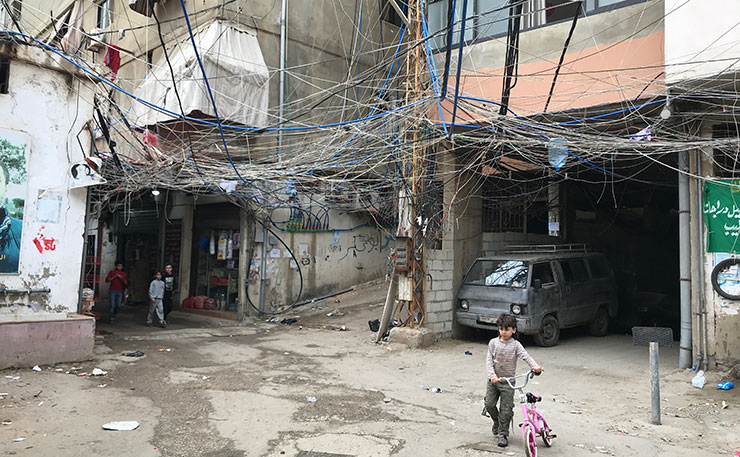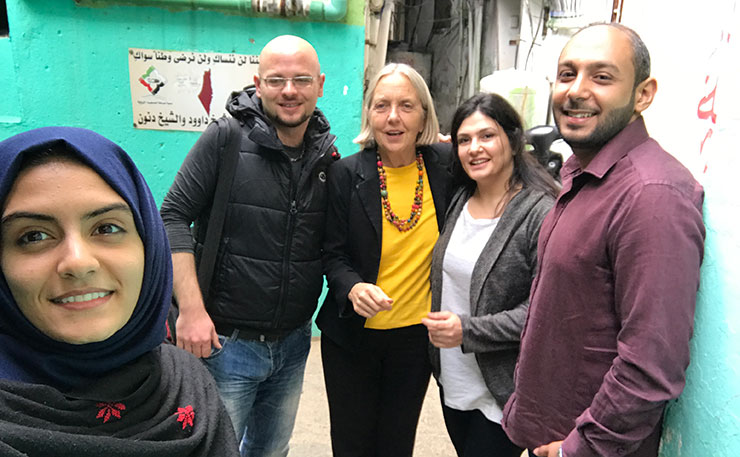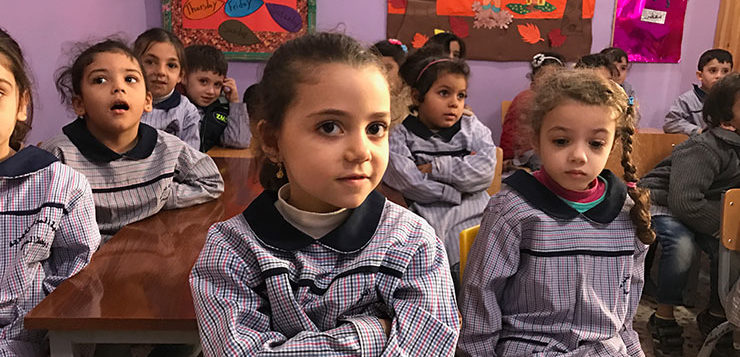The dreams of young Palestinians to return to their homelands have not faded, despite generations of forced displacement, writes Senator Lee Rhiannon.
On a Tuesday afternoon in March, I found myself in the middle of the noise and bustle of one of Beirut’s many busy suburbs. Surrounded by the traffic of people and cars, I couldn’t help but wonder exactly what I should do if I was stood up. I was alternating between the hope the group of young people I was waiting for would be able to find me, and the hope that they felt interrupting their day to meet me would be worth their while.
The aroma of pistachios from the nut roaster behind me had almost won me over when I was greeted with hugs and three kisses (as is the local style) by four smiling young Palestinians who were to be my tour guides through one of Beirut’s larger refugee camps – Bourj el-Barajneh. My pronunciation is far from accurate but I am told it means “tower of towers”, the name of the Beirut suburb next to where the camp is located.
As the five of us walked through the camp, I couldn’t help but be struck by the sheer chaos. I have previously visited other refugee camps in Lebanon and Palestine. But the Bourj el-Barajneh camp – or simply Bourj as it is known – is extraordinary. This camp, one of the poorest of the Palestinian refugee camps, houses a very large population that live in tiny rooms packed on top of each other.
A tangled web of electricity cables droop across the narrow alleys. In recent years over 50 people have died here from electrocution. The dangers are ever present, but still life goes on. Children play on their bicycles, street vendors sell their wares and people stop and chat.

The Bourj el-Barajneh camp was established in 1948 on one square kilometre of land. It was one of several sites the Lebanese government provided to accommodate the thousands of Palestinian refugees who poured into this country when they fled or were forced to leave their homes first by armed Zionist forces, and later by the Israeli army.
Bourj was never intended to house more than 10,000 Palestinian refugees. The current estimate of people living in this camp is at least five times that number.
The demographics of the camp have changed. It is now also home to a significant number of refugees from the Syrian crisis as well as very poor Lebanese locals.
The Lebanese government has not allowed the camps to expand into surrounding land so the camp has had to extend up. Structures become perilously taller as storeys are added to accommodate the growing population. Even the cemetery is full beyond capacity, and people now have to be buried together.
All four of my tour guides were born into the camp, as their parents before them had been. Though their grandparents and great grandparents were the last to have a lived experience of Palestine, these four young people all strongly identify as Palestinians and identify with where they are from in Palestine.
Nadya, the organiser of my tour, was from Sheikh Daeoud and Danoun in Akka (Acre), the same region that Bashir and Taha were from. Amena was from Nablus, though her great-grandparents were amongst those that were forced into exile.
I knew of course that Palestinians around the world maintained their identity as Palestinians despite life in forced exile, but the connection that these young people felt with their ancestral villages was stronger than even I had anticipated.
Nadya told me her remarkable story of being smuggled into Israel in order to visit her village. The adventure was fondly recalled because, as she put it, her family’s village became real.
“It meant so much to me to finally see it with my own eyes. It breaks my heart that I could not bury my grandmother in her village, under a lemon tree as she had wanted.”
Nadya wants nothing more than to see her children’s dreams nurtured and realised and for their lives to be free from injustice.
Amena spoke to me of her feeling of displacement; of growing up in a place she is not from, and not being able to go where she does belong.
“We have dreams and hopes like everyone. We are refugees and we have a right to return to our homes.”

I have been aware of the great wrong perpetuated against the Palestinian people from a young age. In the 1960s my mother, Freda Brown, visited refugees in Palestine. She told me about meeting men and women who showed her the keys to their homes that they were waiting to return to.
The justice of the Palestinian cause was burnt deep into my heart after hearing my mother’s accounts from her 1982 visit to Lebanon. As part of her work with the Women’s International Democratic Foundation, Freda was one of the first western women to enter the Sabra and Shatila camps, after the horrific massacre of hundreds if not thousands of Palestinians. The stories of the survivors and the enormity of coping with the horror and the loss of their loved ones were etched into my mind.
The stories I heard during this visit to Bourj el-Barajneh was a continuation of the stories my mother shared with me. Another chapter in the ongoing Nakba of the Palestinians.
Every year on May 15 Palestinians around the world commemorate the Nakba. The catastrophe: the total destruction of over 400 villages, the expulsion and dispossession of over 750,000 Palestinians, and the continued oppression of millions of Palestinians.
As the Nakba commemoration that will this year enter its 70th year draws closer, I think of the generosity and hopeful dreams of the young Palestinians I met in Bourj camp that day. I think too of the Palestinians I met when I visited Palestine/Israel, and of the many Palestinians born and living in Sydney that I have worked closely with over the years.
I hope that soon I will be hearing and sharing their stories of justice.
Donate To New Matilda
New Matilda is a small, independent media outlet. We survive through reader contributions, and never losing a lawsuit. If you got something from this article, giving something back helps us to continue speaking truth to power. Every little bit counts.




